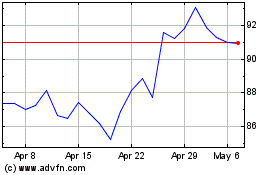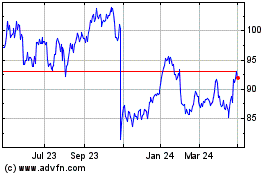Europe Falls Behind U.S. in Funding Coronavirus Vaccine -- and Securing Access
May 19 2020 - 5:56PM
Dow Jones News
By Denise Roland, Noemie Bisserbe and Nick Kostov
PARIS -- As pharmaceutical giants edge closer to a potential
vaccine for the new coronavirus, governments demanding access to
any supplies are running up against a hard reality: the bill.
The tension was cast into relief last Thursday when Sanofi SA
chairman Serge Weinberg took a call from French Prime Minister
Édouard Philippe, according to a person familiar with the matter.
Mr. Philippe wanted to know why the chief executive of the company
-- one of France's corporate crown jewels -- had told an
interviewer the U.S. would be first in line for its potential
coronavirus vaccine.
Mr. Weinberg said Sanofi hadn't promised to prioritize the U.S.,
but that the executive was simply stating the obvious: the company
will start manufacturing the vaccine in countries that help it
shoulder the financial risk of ramping up production before its
vaccine is proven to work.
Europe is lagging behind the U.S. in funding its share of the
billions it will cost to manufacture vaccine doses on an
unprecedented scale. Still, European governments expect their
citizens to be among the earliest recipients of any vaccine against
Covid-19, because the continent is home to pharmaceutical giants
like Sanofi and AstraZeneca PLC that are developing some of the
world's most promising candidates.
On Tuesday, Mr. Macron summoned Mr. Weinberg and other Sanofi
officials to the Élysée Palace, where the company pledged that any
vaccine it developed would be treated as a public good available to
all, according to a presidential aide. Sanofi declined to comment
on the meeting.
In normal vaccine development, companies wait until they have
solid proof that the product works before they increase production,
and even then they roll out supplies only gradually.
To defeat a virus that has killed hundreds of thousands of
people and devastated economies world-wide, however, governments
are expecting drug companies to have hundreds of millions of doses
ready to go as soon as clinical trials show that a vaccine is
effective. But companies say they can't assume the risk of
manufacturing vaccine doses that may turn out to be ineffective
without financial support from governments and other funders.
The U.S. has pivoted quickly to commit funds to certain
vaccines, thanks to a government organization called the Biomedical
Advanced Research and Development Authority, which was set up in
2006 to prepare for biological threats like pandemics and
bioterrorism. Barda has a long history of providing funds for the
development and manufacture of new vaccines to prepare the U.S. for
a flu pandemic. The $2 trillion coronavirus stimulus package
included $3.5 billion for Barda to support manufacturing,
production and purchase of vaccines, drugs and diagnostics for
Covid-19.
Barda has already handed Sanofi $30 million to support early
research into a vaccine. If that candidate goes on to show promise,
the company anticipates that Barda will provide hundreds of
millions of dollars in further support to start manufacturing doses
on a large scale while it is still in testing, according to a
company spokeswoman. Barda has also pledged up to $483 million for
a vaccine developed by U.S. biotech Moderna Inc., another
front-runner that has already shown early promise in human
studies.
The U.K., which left the EU in January, has also moved to secure
access to a vaccine for its citizens. On Sunday, the British
government announced a deal to secure 100 million doses of a
vaccine under development by the University of Oxford and
AstraZeneca. The deal is the first of several agreements the
partners expect to sign to deliver the vaccine across the globe,
according to a company spokesman.
The EU has contributed EUR1.4 billion ($1.53 billion) to the
Coronavirus Global Response, a fund aimed at supporting the
development and global distribution of diagnostics, treatments and
vaccines for coronavirus. It isn't yet clear how the EU-led fund,
which has so far raised EUR7.4 billion in total, will distribute
money between projects and how it will ensure fair access around
the world.
What the EU truly lacks is a body that can coordinate its
spending on vaccines. Officials are rushing to create a European
equivalent to Barda from a standing start. They intend to evaluate
various vaccine candidates over the coming weeks and provide more
clarity on funding plans in the summer, according to the person
familiar with the talks.
"In Europe they woke up very late to this," said someone
familiar with the talks between vaccine makers and the European
Commission, saying that officials at the commission and in member
states didn't appreciate the role of governments in supporting
emergency vaccine development. "There was not a sense of
urgency."
Sanofi has held talks with the Commission as well as a number of
member states about how to finance manufacturing for a vaccine in
Europe, according to people familiar with those talks. One option
is for countries to promise to buy a certain number of doses in
advance, according to people familiar with the talks. European
countries already use these advance purchase agreements to buy
supplies of the seasonal flu vaccine.
European officials are trying to avoid a repeat of the fight for
resources that erupted across the continent early in the crisis.
Shortages of protective gear and ventilators ended up pitting
countries against each other and exacerbating the North-South
divide as Germany kept a lid on mortality while Italy saw its
hospitals overwhelmed.
Since then the Commission has tapped emergency funds to jointly
procure protective equipment like gloves and masks, as well as
ventilators, for distribution across the bloc. It has also provided
an EUR80 million loan to German vaccine maker CureVac AG to speed
up the construction of a plant that could potentially churn out
billions of doses of its candidate vaccine. Still, the company will
need further support to start manufacturing the doses at a large
scale, according to a company spokesman.
For multinational companies like Sanofi -- accustomed to easily
supplying drugs and vaccines across national borders -- the
international tug of war is jarring. A person familiar with the
talks between Sanofi and the French government said discussions
were "trapped by this nationalistic view, which is contradictory
with the science and the medical necessities."
--Valentina Pop in Brussels contributed to this article.
Write to Denise Roland at Denise.Roland@wsj.com, Noemie Bisserbe
at noemie.bisserbe@wsj.com and Nick Kostov at
Nick.Kostov@wsj.com
(END) Dow Jones Newswires
May 19, 2020 17:41 ET (21:41 GMT)
Copyright (c) 2020 Dow Jones & Company, Inc.
Sanofi (EU:SAN)
Historical Stock Chart
From Mar 2024 to Apr 2024

Sanofi (EU:SAN)
Historical Stock Chart
From Apr 2023 to Apr 2024
